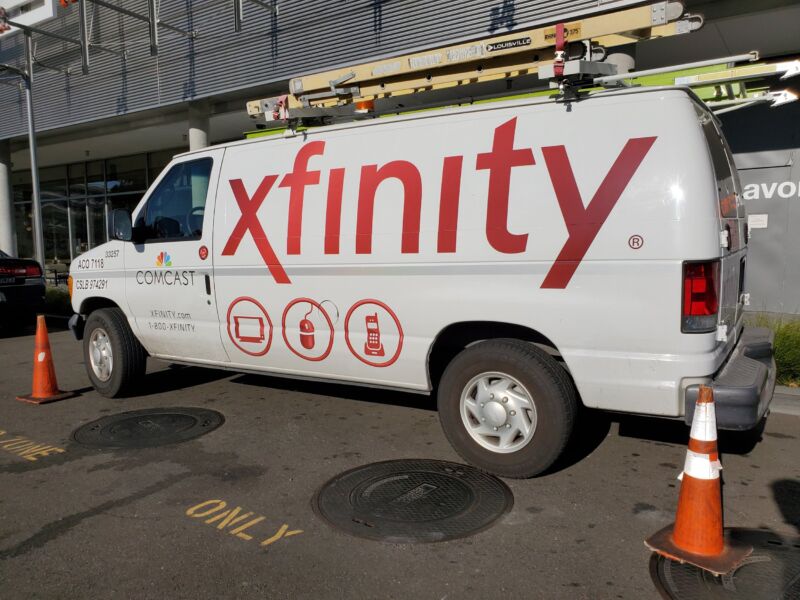
Comcast has fessed up to another mistake on the national broadband map after previously insisting that false data it gave the Federal Communications Commission was actually correct.
Our report on February 9 showed that when residents in two Colorado cities objected to Comcast’s coverage claims through the FCC challenge system, the company disputed those challenges even though it was impossible to order Comcast Internet service at the challenged addresses. As we previously wrote, Comcast only admitted to the FCC that it submitted false data in Arvada, Colorado, one day after we contacted the company’s public relations department.
But Comcast hadn’t yet admitted that it gave the FCC false data in Fort Collins, Colorado, at the time of our last report. That changed last week in a letter to the FCC. “Upon further review of the location ID in question, Comcast has determined that the location is currently not serviceable by Comcast,” the company told the FCC.
The letter came in response to a challenge filed on November 19 by Justin Olsson, who contested Comcast’s claim to cover the house where his mother lives on Kedron Court in Fort Collins. Comcast had disputed Olsson’s challenge on January 21 but changed its tune after our article.
A member of Comcast’s executive customer relations department sent Olsson a copy of its new letter to the FCC on Friday. Olsson, a lawyer for a tech company in California, showed us the letter and his response to Comcast. He wrote:
I appreciate that you finally admitted it after Ars Technica reached out to you… I would like to point out, however, that it’s really absolutely unacceptable that you contested my challenge without even looking into it—even when you had evidence in your own system that the address wasn’t serviceable.
You wasted hours of my time, and it’s hard not to think that was part of the strategy, hoping that people wouldn’t follow up and letting you get away with your blatant dishonesty in the broadband map effort. I hope for the country’s sake that you all can clean up your act and not continue to do business in this way.
Comcast needs to make more corrections
Including the address challenged by Olsson, we found 13 residential addresses that Comcast claims to serve on the FCC map in that part of Fort Collins despite all addresses being labeled as “invalid” on Comcast’s ordering website. The addresses all appear to be just outside the southern edge of Comcast’s actual coverage area.
Comcast’s new letter to the FCC said it submitted an update to mark the challenged address as “not serviceable.” The change hasn’t taken effect on the public version of the FCC map yet, which is updated with corrections every two weeks.
In addition to Fort Collins, our previous article detailed Comcast’s false coverage claims in Arvada. We found over 30 addresses that Comcast claimed to serve on the FCC map, even though each address was listed as “invalid” on the Comcast website.
Resident Matthew Hillier challenged Comcast’s claim to cover his home on Quartz Loop in Arvada. Comcast disputed the challenge despite the clear evidence that it didn’t serve the home and only admitted the error to the FCC after we contacted Comcast public relations. Comcast’s coverage claim was removed from Hillier’s address, but the FCC map still incorrectly says Comcast serves the surrounding homes where it’s also impossible to order Comcast Internet.
Correcting false data is important because the map will be used to determine which parts of the US are eligible for $42.45 billion in federal grants to expand broadband availability starting in mid-2023. As we’ve written multiple times, one problem with the FCC’s challenge system is that a successful challenge at a single address doesn’t necessarily result in mistakes being fixed at surrounding homes.
For our February 9 story, we didn’t get any answer from Comcast on whether it would correct errors at the surrounding addresses we pointed out in Arvada and Fort Collins. We asked Comcast the same question for this story and received a response this time. “The homes you identified are in the process of being vetted, and we will make any corrections necessary as quickly as we can,” Comcast told Ars.
FCC: Process “working as designed”
The FCC says it can conduct audits of provider-reported availability information and confirmed to Ars last week that it has “multiple ongoing” investigations into data submitted by ISPs. One of those investigations began after our report about an Ohio ISP called Jefferson County Cable, which admitted to lying to the FCC about the size of its network in an attempt to block funding to rivals. While the FCC confirmed an investigation into Jefferson County Cable, it hasn’t yet confirmed an investigation into Comcast.
A spokesperson for FCC Chairwoman Jessica Rosenworcel told Ars that Comcast’s correction of the Fort Collins mistake shows the challenge process is working as intended. “The response you shared from the provider is an indication that the challenge process is working as designed and can be an effective tool for correcting inaccuracies in provider-reported availability information,” the FCC spokesperson said.
But it’s unclear how this specific Comcast incident could prove the process is working as intended. With both the Fort Collins and Arvada coverage claims, Comcast disputed the challenges despite clear evidence that it didn’t serve the homes and only admitted its coverage claims were false after we contacted Comcast on the residents’ behalf.
https://arstechnica.com/?p=1919542

